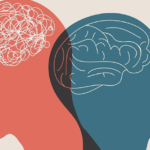According to WHO ‘one in four people’ in the world will be affected by mental or neurological disorders at some point in their lives. Around 450 million people currently suffer from such conditions, placing mental disorders among the leading causes of ill-health and disability worldwide. In the most developed country like USA 30 Million people are under Depression as per the current report. A study conducted by the World Health Organization in 2015 shows that one in five Indians may suffer from depression in their lifetime, equivalent to 200 million people. Due to the stigma associated with mental illness, a lack of awareness, and limited access to professional help, only 10-12% of these sufferers will seek help.Dr. Christian Fredrick Samuel Hahnemann (Founder of Homeopathy) in his Medical books ‘The Theory fo Chronic Diseases’ and ‘Organon of Medicine’ elaborately described the nature and its treatment of Chronic Diseases. He categorized diseases into distinct types and specifically narrated the way of treatment of Mental disorder from Aphorism 210 onwards in his book ‘Organon of Medicine’. MENTAL DISEASES –Dr Hahnemann classified Chronic diseases fundamentally into two categories; disease having Venereal Origin and Psoric Origin. Most of the diseases what we are sighted is various forms are of Psoric origin. Yes! Mental diseases are Chronic Developed Diseases having Psoric in origin and it is one of the best examples for ‘one-sided diseases’. The term “One-Sided” itself displays the meaning that most of the symptoms are obscured by ‘Symptoms of Disease, as a result, we get only fewer ‘Symptoms of Patient’. Because of this one-sided nature, it belongs to one of the difficult categories to show a complete cure. Mental diseases are not a sharply separated from all other diseases for this reason that, in other diseases also patient’s disposition is altered; (For example – A severe itching in the skin can evoke anger in a person) hence it has to be cured in the same way as all other diseases. Homoeopathy is a system where we are giving utmost importance to Mental Generals for treating many other diseases (For example Anger when ill in a previously mild natured patient or an angry person when ill becomes moody or sad) hence logically speaking we should be able to treat Mental disease more effectively.Homoeopathic Treatment is always based on the principle ‘Similia Similibus Curentur’ means let likes be cured by likes discovered in 1796 by Dr Hahnemann. Diseases can only be cured by a remedy which has the power to produce a similar morbid state while proving on healthy human beings. Anti Psoric drug analogous to the disorder of mind and the physical symptom are selected on basis of Totality of symptom along with the regulated mode of life are the base in Homeopathic Prescription. In Homeopathy, the totality of abnormal sensations and functions are considered for a prescription. In which it includes mainly 1) Pathological Symptoms (Symptoms of the Disease + Symptoms of the Patient) 2) Physical Generals (Any change in Appetite, Thirst, Stool, Urine, Sleep and Sex) 3) Psychological traits (Habitual pattern of behaviour, thoughts, and emotions) and Disposition (Inherent qualities of mind and character). In short, a Holistic approach can be seen throughout the treatment. At the juncture of prescribing ‘symptoms of the patient’ are given more importance E.g.: In a case of Depression, Sadness is a ‘Symptom of Disease’ while Sadness with time modality makes it an individualized ‘Symptom of Patient’. In Psychiatric cases patients may not be in a state of explaining all these symptoms in a well-defined manner as in other diseases hence we must depend on relative’s narration, objective signs he is showing, and the symptoms shown in lucid intervals. Every person is Unique! Such characteristics of the patient when considered, better and effective treatment can be accomplished in the diseases like Depression, Anxiety, Stress-induced diseases, phobias, OCD, Autism, ADHD, Personality disorder, Insomnia, Alcohol dependency to name a few. Many mental and emotional diseases are nothing more than the transition of Physical symptoms into Mental Disease. E.g. Suppuration of lungs can lead to melancholia and mania like a stage, Hypothyroidism can lead to mood disturbance and cognitive dysfunction, Psychosis. Brief psychotic disorders are short term non-recurring, a time-limited disorder involving abnormal mental function or loss of touch with reality. E.g. Postpartum psychosis and other stress-induced psychosis. It gets affected to those who are more susceptible to personality disorder in response to stress like the death of a child, spouse, relatives, friends, divorce, family and workplace conflict, a natural disaster to name a few. It affects typically to those who have not developed an effective adult mechanism to cope up with life. Identity formation happens by around the age of puberty and those who has not developed identity formation has more chances of conflicts in life where they have to struggle to overcome the threats faced in real life. When life becomes more demanding and difficult than they can tolerate, person lapse into a brief psychotic state. A very important point to be noted in BPD is that it shows early signs of many other diseases such as Schizophrenia or a defensive mechanism in response to stress in some individual with a personality disorder. In a normal course, a person gets back to the normal stage with support and comfort. If not leads to other diseases and requires medical care. In Homeopathy Dr. Hahneman has broadly classified Mental Diseases into 5 categories 1) Mental disease which yet not developed and still somewhat doubtful whether it is aroused from corporeal or not or If it is not from faults of education, bad practices, superstition, ignorance. Treatment suggested is to consider this as, which has to be corrected with friendly exhortations, consolatory arguments, sensible advice, or can say psychological counselling. 2) Real Mental malady depending on bodily diseases – Almost all mental and emotional disease are nothing more than the Physical diseases in which derangement of the mind and disposition peculiar to each of them is increased while Physical
+91 9778458977
uniquehealth365@gmail.com
#





